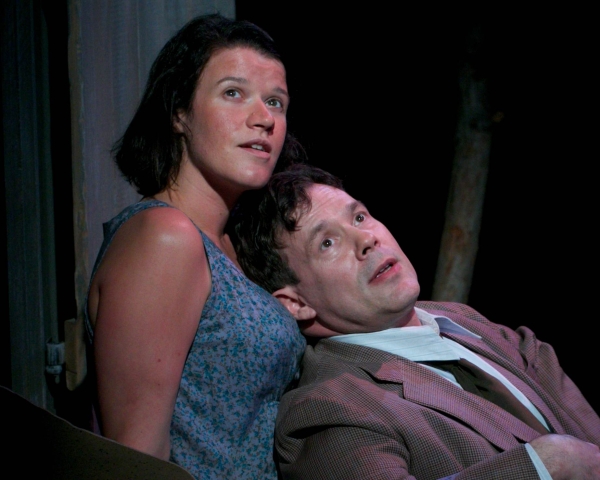A Moon for the Misbegotten

(© Jeanne Tanner)
St. Patrick’s Day may be recently past, but the spirit of the Irish persists into April in Ventura. Only do not, dear viewer, enter the Rubicon Theatre seeking an excess of blarney. Despite the stacking of cons and trickery in Eugene O’Neill’s A Moon for the Misbegotten, director Jenny Sullivan’s revival offers as desperate a quest for truth as you’re likely to see. With Rebekah Tripp, Joseph Fuqua, and Granville Van Dusen dancing their way through O’Neill’s maze of moonlight, bourbon, and regret, sweet heartbreak is the only outcome for performers and audiences alike. Fortunately, they are served up by an American master writing at the top of his game, and by a company who knows exactly how this game is to be played.
A character study of O’Neill archetypes as much as a story with dramatic arc, Moon builds to an encounter between Josie Hogan, the daughter of a pig farmer living on fading actor James Tyrone’s land in rural Connecticut. But even if you know the play's outcome, O’Neill’s final work, you don’t see what’s coming. Sullivan and her first-rate cast do not bring in the desperation until we’re good and ready for it.
Until that happens, nobody seems to be suffering. Tripp’s Josie sweeps away any suggestions that she’s capable of longing or in need of a man. With her last brother to be sent packing, a father to feed, fields to tend, and swine to slop, this earthy lass really hasn’t got time for the pain. High jinks and revenge, however, are another matter. Van Dusen (as Josie’s "old billy goat" of a dad, Phil Hogan) and Tripp punctuate their delight at successfully driving off rich neighbor T. Steadman Harder (played by Scott Roberts) by dancing a giddy little jig.
Van Dusen and Tripp deliver a father and daughter who are clearly cut from the same rough-hewn cloth. Mannerisms, gestures, and bristles are all shared, down to Van Dusen and Tripp sitting with identical open-legged splay (it’s a bit more seemly on Phil). Their scenes together crackle with bitterness, spice, plenty of humor, and – ultimately –genuine tenderness.
O’Neill aficionados will remember James Tyrone Jr. from Moon‘s sort-of prequel Long Day’s Journey Into Night, and we learn plenty more about Tyrone and his dissolute New York ways from the Hogans before he even puts in an appearance. When Fuqua’s Tyrone finally arrives on the scene, he proves that he can both jape and sandbag with the best of 'em. Tyrone comes to the Hogan’s farm sweating and conscience-addled, but with no trace of awkwardness at being around the Hogans. Cons? Fabricated love scenes? Our James may be soused, but he’s also game. Once the daylight hours fall away and the moon pours its poesy-inducing light over the front stoop of the Hogan’s Connecticut farmhouse (both designed and lit with rustic subtlety by Thomas S. Giamario), Tyrone and Josie are rendered defenseless, and O’Neill’s stakes become far higher than a roll in the hay or a property deed.
Fuqua’s Tyrone is a tortured soul, still boyish of face, whose charm is increasingly tied to the estate he’ll inherit. The suit he is wearing may have seen better days, and is certainly better suited for New York than for a rural Connecticut farm, but he still wears it well. Just as important, Fuqua’s Tyrone is a talented actor who can still play a role convincingly. The Rubicon Misbegotten is the 23rd time Sullivan and Fuqua have worked together, and the comfort level between actor and director is evident.
That late summer moonlight, which O’Neill’s characters so hungrily anticipate, is practically a sixth character. Lighting designer Giamario ushers it in nicely. He also does right by a golden morning-after dawn that envelops Tyrone and the Hogans. The playwright, whose works don’t foresee many dawns, would have appreciated it. A Moon for the Misbegotten was Eugene O’Neill’s grand farewell, and a revival as classy — and heartbreaking — as the Rubicon production is cause for celebration.











